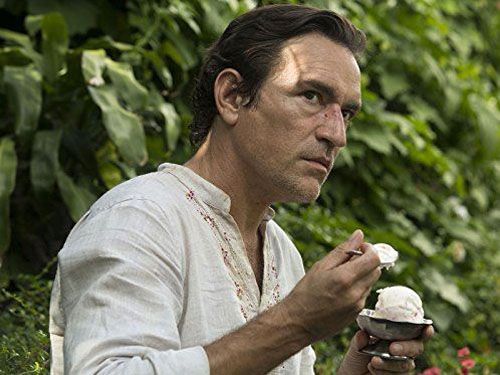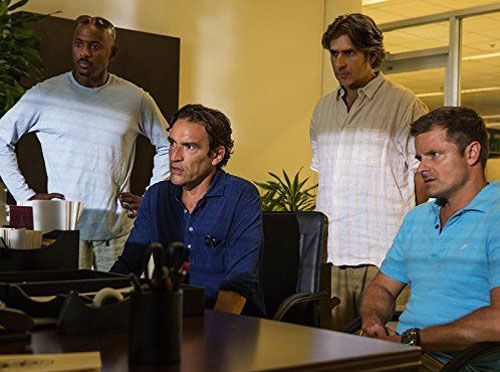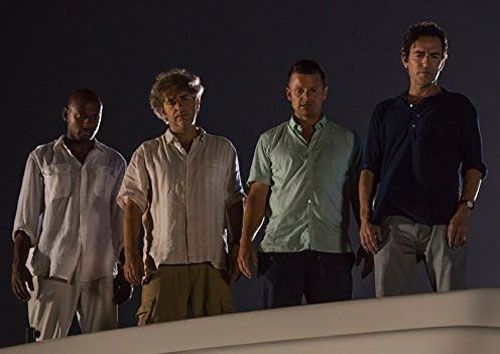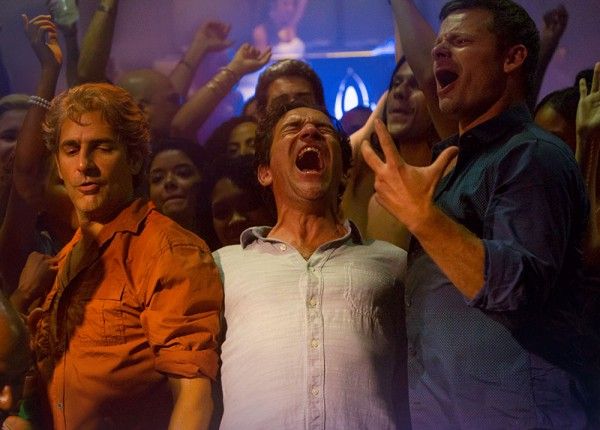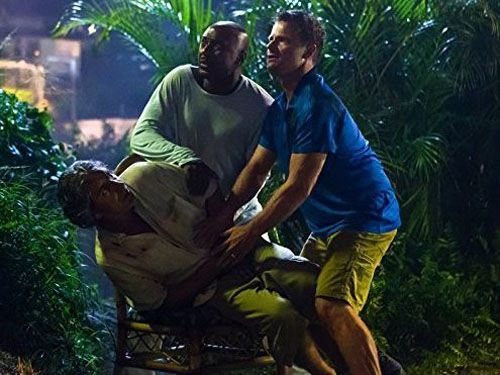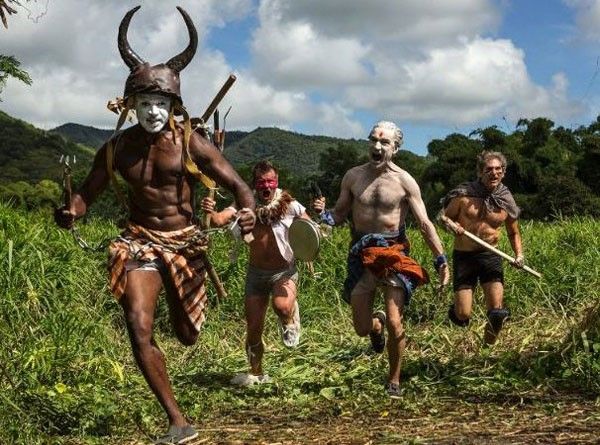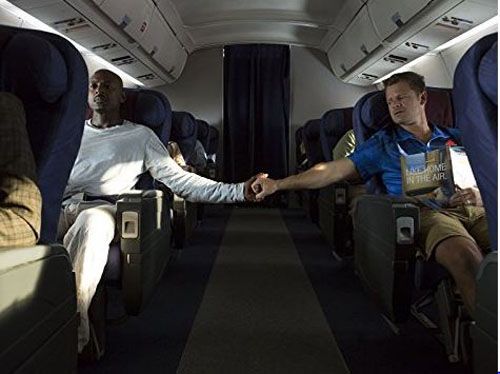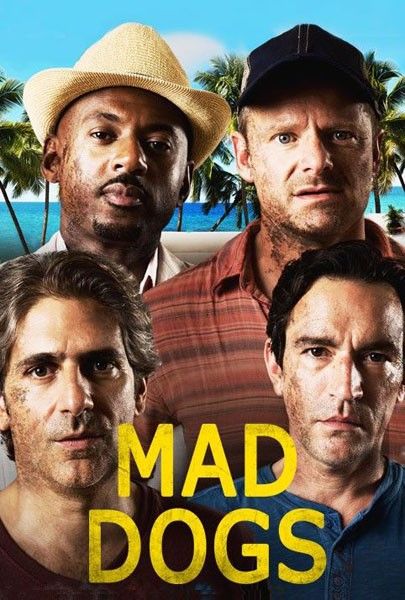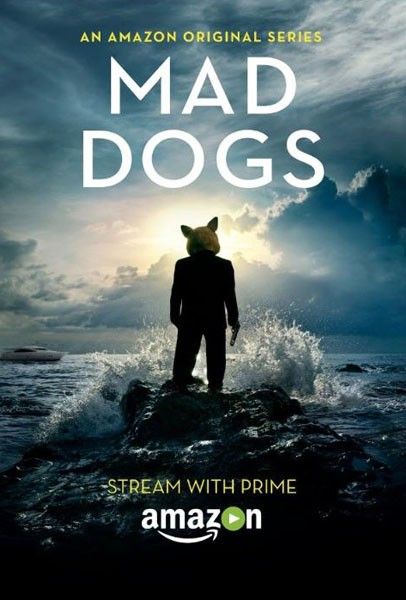From executive producers Shawn Ryan and Cris Cole (the creator of the original UK series of the same name), the Amazon Prime series Mad Dogs follows what happens when a group of underachieving 40-something friends gather in Belize to celebrate the early retirement of an old friend. Once they’re in paradise, a series of wild events unfold, exposing dark secrets, deception and even murder. The series stars Ben Chaplin, Michael Imperioli, Steve Zahn, Romany Malco and Billy Zane.
Unfortunately, Amazon and Shawn Ryan recently decided to part ways on any future episodes. We spoke to Ryan for this exclusive interview with Collider prior to that announcement, but he gave such interesting insight into what went into developing and making Mad Dogs that we thought it would still be worthwhile to share. He also talked about the new time travel pilot he’s doing for NBC with Eric Kripke (Supernatural), called Time, as well as what it’s like to be a showrunner, including his experience during the pilot of his first series with those duties, The Shield.
Collider: How did you end up coming across the original UK series and was there something that you immediately saw in it that made you want to adapt it for the US?
SHAWN RYAN: I’m always looking for writers to work with. I really enjoy collaboration rather than just sitting in the dark in my man cave on my own, trying to write stuff. There’s a woman I work with, Marney Hochman, who heads up my company, and she had heard about the UK version of Mad Dogs. At one point, she passed to me the script of the first episode of that series, and I read it and really liked it. Then, we got ahold of DVDs of the first four episodes and watched them. I was just fascinated. The tone seemed very different from anything on TV and the story was so unconventional, in a great way. There were all of these great moments, and I was intoxicated by it. But, my first instinct wasn’t to remake it. I’m not in the business of remaking things that I think work pretty well. I was very interested in meeting with Cris Cole, who created it. He was out here in the States, so I met with him and talked about how much I liked the show, and I asked if he’d be interested in developing something new with me.
We spent a few months talking and developing an idea together, and then, at that time, the company that I work for, Sony, ended up buying the production company, Left Bank, that had made Mad Dogs. The guys at Sony were like, “Hey, is there any interest in making an American version of Mad Dogs? We know that you’re already working pretty closely with Cris. Is that anything you’d be interested in?” My initial reaction was, “Probably not. It’s already so good. But, let me talk to him.” So, I went to Cris and said, “The guys at Sony asked about this, and I’m just passing it along. Is that something you’d be interested in? I don’t want to just make another version of the same thing.”
He thought about it for a day or two and came back and said, “When we initially made this, we only made four episodes and I thought that was all it was going to be. And then, it was successful and we ended up making more, but I never knew there was going to be a future, so I never planned it out right. There were certain choices that got made that, in retrospect, I wish we had done differently. So, actually, I would be interested in doing another version, if we could do a lot of stuff differently.” That was music to my ears. I said, “Okay, let’s talk about it.” So, we spent a lot of time talking about what he wanted to do differently, and we talked about the difference between American men and British men and how that would impact our storytelling. We both started to get really excited, and we had a long development process, eventually landing at Amazon. I’m really glad that he wanted to give it another crack.
Doing a show for Amazon, you know that people are going to get the full season. Did you find yourself setting up the season differently, knowing that viewers would get access to every episode?
RYAN: There are definitely things you do differently, but it can cut both ways. We’ve talked about how the show might be perceived, if it was on weekly rather than binging. This is a show about how the world is fucking with these guys. When we were making it with time between episodes, there was a certain logical nature to everything. Watching them together, it feels like a lot of bad things happening in a very short period of time, so I wonder about that. But yes, we spent a lot of time talking about what the experience would be like, watching on Amazon where people have the ability to go from one episode into another. We had the desire to end episodes in a way that made you want to click play on the next episode, even if it was costing you sleep. I’m not sure if we have the ramifications of watching this way mastered, but we spent a lot of time talking about how that affects the creative side of things.
What do you see as the future of this series?
RYAN: I’m not sure how long this series would go on for. I don’t think this is a seven or eight season show, and probably not even four or five with exactly this cast. It was originally developed as a 10-episode, close-ended mini-series, but we have been thinking about what stories there are to tell after the 10 episodes, and how they might be different, either in location or by adding some new characters, etc. It seems like this show has hit a nerve with a lot of people.
It seems like, if you were to continue on with this series, you’d have to spend some time thinking about how not to get stuck in the cycle of the same thing, over and over.
RYAN: Yes, and that’s the danger of a show like this ‘cause you don’t have the engine of a cop investigating a case, or a doctor trying to save a patient, or a lawyer trying to win a case. It’s high stakes and it’s farce, and farce is built on the idea of crazy things happening. So, the question is how long can a TV series, as opposed to a two-hour movie, sustain high-stakes farce? It’s something that we push the limits of in Season 1. A lot of people really like it, but there are a few detractors who have felt like we’ve pushed it too far for them.
You mentioned deviating from the original series. Did you decide to stay true to the tone of the original, or have you completely put your own stamp on it?
RYAN: I would say there are similarities in tone, in terms of a combination of the darkly comedic, the macabre, the silly, and the emotional. I was mostly referring to the plot, itself. The pilot has a lot of similarities to the first episode of the UK series, but the next few episodes have increasingly less to do with it. And then, when we get to Episode 5, it’s really a whole new thing. There are a couple of elements, after Episode 5, that pop up from the British series, but for the most part, it becomes its own unique creation, at that part, which was important to us.
What were the biggest changes, as a result of it being about American men instead of British men?
RYAN: The biggest change just comes from casting. You can write a character a certain way, but the minute you cast an actor, that character is going to start to bend towards that actor and their persona. With somebody like Steve Zahn, his equivalent character in the UK series feels a lot different. I think it’s more due to the performance than it is to the writing, although we did write it differently. The other big difference, from a writing perspective is that American men tend to speak their minds a little more plainly, whereas British men can be a little bit more reserved and they can hide behind innuendo, at times. On occasion, there’s a directness in the way our characters deal with each other, that’s slightly different and disguised in the British series.
Was this group of actors the actors you specifically thought of for these roles, or did you go through an audition process?
RYAN: We auditioned a lot of people. These actors didn’t necessarily audition, but it took us a little while to get to them. You’re not just casting four different roles, you’re casting four different people who believably are the same age range and went to college together, 20-some years ago, and can believably have been friends then and believably be friends now. When we started the casting process, we really investigated three different age ranging – their late 30s, their mid-40s and their late 40s. We were discussing different potential combinations of all three different age ranges. It wasn’t until we got Steve Zahn and Ben Chaplin on the hook. Once we said, “Okay, these two guys feel good together,” we were like, “That’s the age range.” And then, we had to find the other two, or three if you include Billy Zane’s character, who fit. Romany [Malco] came next, and Michael Imperioli was the last one. He came very late. We were having a real difficult time casting that role. Everyone was so happy with the other three guys that you needed someone that felt of equal stature with them. It would have felt odd to have the three of them, and then have somebody who was a little bit more unknown. For a long time, we were under the impression that Michael wasn’t going to be available during our timeframe, so we weren’t considering him. And then, at the last minute, he became available, so we brought him in and he fit. So, it was just about deciding who those first two lynchpins were that we could work the rest of the cast around. We got them locked in, and then we tried to fit the final three pieces of the puzzle in with them. It was hard. It was a tough casting process, but it really paid off. We were very exacting.
You’re currently working on an NBC pilot, called Time, with Eric Kripke. How did you team up with him?
RYAN: That was something he initiated. We’re both in similar positions, in that we’ve both created long-running, successful cult shows, him with Supernatural and me with The Shield, and we both had our individual success in our careers. One of the things about showrunning is just how damn hard it is and how lonely it can be to be the person doing that. So, since then, I’ve always looked to partner up with people to do stuff, and I think he’d come to that same conclusion. He had the very basic germ of an idea for a time travel show, but didn’t have a lot of detail. He had recently joined Sony, which is the studio I work at, and was interested in me. He called up cold one day and said, “I’ve got this idea for a pilot. I’d be interested in doing it with someone. Would you be interested in hearing what I’ve got?” He came in and talked about the idea, and there wasn’t a lot there, but the germ was of interest to me. I said, “Well, I’m always looking to partner up with people, too. What if we just took two or three days and try to beat this idea out. At the end of it, if it’s something we’re both excited about, great. If not, no hard feelings.”
After a few days, we had something that we were both really excited about. We went out and pitched it and were fortunate that there were a few different networks that wanted to buy it, and NBC really stepped up aggressively to take it off the table from the other places. It’s a little bit of a challenge because you’re used to always getting your way, as a boss, but now you have to share the decision making, and sometimes you feel one way and the other guy feels very, very passionately the other way. That’s been an interesting change for me, but it’s also invigorated me. Eric is a guy with really high standards and he keeps me on my toes. We’re in the process of casting, and we have a great director on board with Neil Marshall, who’s directed probably the two biggest and amongst the best episodes of Game of Thrones. We’re thrilled to have him on board.
Are you establishing your own time travel rules for that show, or are you using anything as a guideline?
RYAN: Anytime you do time travel, you’ve gotta have rules. I’m not sure that you can come up with completely new rules that versions of haven’t been used in other things. But ever since I dove into this territory, what I’ve learned is that for a thing that is completely theoretical and non-existent, at this point, people really do have firm opinions about what the rules of time travel are. I’m not sure why they’re so sure, but they are sure. So, we’re crafting rules that make sense for us and that we think will help sustain a long-running series. Like any genre show, whether it involves zombies or vampires and demons, you want consistent rules that people understand, but ultimately, the show succeeds or fails on the depth of the characters and the personal connection that the characters make with the audience. We’re going to try to button up everything on the genre/sci-fi/time travel of it all, but most of our attention is going to trying to make characters that people really respond to.
As the showrunner of a TV series, you’re responsible for everyone and everything, and you’re ultimately the one who gets the credit or the blame for the finished product.
RYAN: Sometimes the lead actors do, as well. I have sympathy for the ones on the poster. But, we certainly share a big chunk of it.
What do you enjoy most about being in that position, and what do you most dread about being the one responsible?
RYAN: What I love the most is that you get an idea on a Monday, you put it into a script on a Wednesday or Thursday, and the following Monday, they’re filming it. A week or a week and a half after that, you’re in the editing room, editing it. And a short time after that, people are watching it. That’s an incredibly intoxicating process. There’s a speed to it that is not for everyone, but that I’m addicted to. I have to make quick instinctual decisions that I then have to live with on camera. That’s a real challenge, and one that I love.
Certainly, the worst part about showrunning is just the logistical side of things. It’s not unusual for me, on a given day when I have a show in production, to get 200 to 250 emails a day and 15 phone calls a day that I’ve gotta deal with because I’m needed in the editing room, I’m needed in the writers’ room, I need to polish a script, and I need to get on the phone with a director or actor. Even if you’re good at time management, there’s never enough time in the day to deal with everything, so you have to delegate properly. If something falls along the way or gets screw up, it is on you. It’s your fault because you did something wrong, or you forgot to do something, or you delegated to the wrong person, or you didn’t give the person you delegated to the proper instruction for them to do the job properly. Ultimately, it’s on your head. And there’s really no vacation from the job. That’s the worst part. On the weekend, you can try, but you can’t stop thinking about the show and what’s coming up. You can’t be in the shower without thinking about it. You can’t be driving your car without thinking about it. There really is no mental vacation, even for 30 minutes, from a show that’s actively in production and that can be tiring.
What do you remember about the first day on the first set you were the showrunner for? Was there a sense of knowing it’s what you were meant to be doing, or did you feel like you had no idea that that’s what it was?
RYAN: More the latter. That would have been shooting the pilot of The Shield, which we shot in 2001. I was 34 years old, at the time, which is relatively young in the business. I had been trying to be a writer in Los Angeles for 11 years, at that point, so it wasn’t like I’d just shown up, but it was such a leap from my responsibilities on my previous two jobs. There were so many things I didn’t know. Members of the crew and the actors clearly knew what they were doing, but I wasn’t sure what I was doing, other than being there to make sure that the script got conveyed in a way that I felt was appropriate. It took me awhile to feel like I belonged in that environment. The only thing that helped was that I really knew that script. Inside my heart, I knew those characters, so I just acted instinctually and answered questions I thought would serve the other people’s understanding of the script and the characters. That was just my guiding North star. It was about, what does this show need? What does this particular scene need? And if I saw that the director or one of the actors was getting too far afield, it was my job to comment on that.
With a pilot, you really are sharing responsibilities with the director and the line producer. It’s really a three-headed monster. It wasn’t until the pilot was picked up to series that I was like, “Okay, I have to hire the writers. I have to be the one that decides which writers I want to hire. I have to be the one with some help and some assistance by deciding who I want to direct this show.” People were coming to me for things I’d never really done before, and it took awhile to feel like I belonged. It was clearly something I wanted to do, and certainly on that show, I wanted to be the person guiding the process ‘cause I understood that world so well, but it was intimidating at first and there were definitely moments where I felt like an imposter.
Mad Dogs is available at Amazon Prime.


